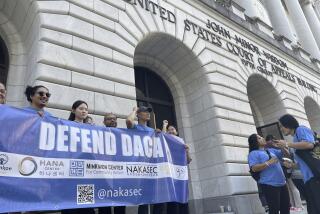Supreme Court weighs rules for jailing immigrants who are fighting deportation

The court’s conservative justices said they were inclined to reverse a 9th Circuit Court decision requiring immigration judges to give a bond hearing and consider possible release for noncitizens who have been jailed for more than six months, while
- Share via
Reporting from Washington — Facing the likelihood of dramatically stepped-up deportations under a President Donald Trump, the Supreme Court justices sounded closely split Wednesday over whether the government can indefinitely jail immigrants with criminal convictions while they fight legal efforts to remove them from the country.
Trump, who made illegal immigration one of the platforms of his presidential campaign, has promised to deport as many as 3 million immigrants once he takes office, and the Supreme Court case involving a Los Angeles immigrant could give his administration greater leverage.
Citing a 1996 law that mandates the “detention of criminal aliens,” Obama administration lawyers urged the justices to give the government broad discretion in handling such matters.
The court’s conservative justices appeared inclined to reverse a 9th Circuit Court decision requiring immigration judges to give a bond hearing and consider possible release for noncitizens who have been jailed for more than six months as they fight their deportation.
Trump’s victory assures a conservative majority on the Supreme Court. »
Liberal justices sounded unsure as to whether a specific time limit can be upheld.
Acting Solicitor Gen. Ian Gershengorn urged the court to rule no hearings are required. He said Congress made a “categorical judgement” that there is a “real flight risk” if these “criminal aliens” are released. Therefore, he said, they can be held indefinitely until their claims are resolved.
Under the law, immigrants who are guilty of an “aggravated felony” are slated for mandatory deportation. However, those with minor offenses on their records can fight their deportation if they have a family and other ties to this country.
Immigration advocates argued that even non-citizens should benefit from the constitutional guarantees of due process.
“We just talking about the need for an inquiry, that is, the need for a hearing that is individualized,” Ahilan Arulanantham, an American Civil Liberties Union attorney, told the high court.
Arulanantham said immigrants should be deemed eligible for release if they show they present no safety or flight risk. He represents a class of legal immigrants, many of whom have jobs and families in California. Many had prevailed in their deportation challenges, but only after spending a year or more in jail.
The lead plaintiff in the case is Alejandro Rodriguez, who was brought to the U.S. as a baby and eventually obtained lawful status. Because of a drug possession and “joyriding” conviction as a teenager, he was slated for possible deportation and detained for more than three years as the case proceeded. He eventually won and was released.
For the 4th time, the Electoral College picks the loser of the popular vote. »
Oddly enough, the government’s lawyer acknowledged that it is understood that bond hearings are given to immigrants who are detained for being in the country illegally. But the same rule does not extend to immigrants, here legally or illegally, who are taken into custody by immigration agents because of a criminal conviction.
Justice Stephen G. Breyer said he agreed on the need to set a clear rule for the future, acknowledging the scope of the problem. “We’re dealing with tens of thousands, hundreds of thousands or millions of people possibly,” he said.
Justice Elena Kagan spoke up for the need to set some limits on the detentions. The Constitution has been understood to mean “you can’t just lock people up without any finding of dangerousness, without any finding of flight risk, for an indefinite period of time, and not run into due process,” she said.
But Chief Justice John G. Roberts Jr. and Justice Samuel A. Alito Jr. said they saw no need for such a ruling. Roberts said people who think they are being held in violation of the Constitution can hire a lawyer and file a “habeas corpus” suit before a federal judge.
The ACLU lawyer said that was an unrealistic option for most immigrants who are taken into custody. Such a suit could take years to resolve, he said.
In 2003, when the justices last dealt with this issue, they said immigrants who faced deportation could be “detained for a brief period” while their claims were resolved.
More recently, the 9th Circuit Court and the 2nd Circuit Court in New York defined that period as no more than six months. After that, the courts said, jailed immigrants are entitled to a bond hearing in which a judge can decide if they can be released, provided they present no danger and are not a flight risk.
In the past, Justice Anthony M. Kennedy has voiced concern about holding people in immigration jails with no hearing. But he said little Wednesday to suggest he would uphold the 9th Circuit’s ruling.
The case, Jennings vs. Rodriguez, could prove to be the first major Supreme Court decision of the Trump presidency. A decision is expected early next year.
The justices may split 4-4 on the outcome. If so, they are likely to hold the case and await the arrival of a ninth justice appointed by Trump.
On Twitter: DavidGSavage
ALSO:
Can Trump put another Justice Scalia on the Supreme Court?
UPDATES:
2:50 p.m.: This article was updated with additional quotes and analysis.
This article was originally published at 11:45 a.m.
More to Read
Sign up for Essential California
The most important California stories and recommendations in your inbox every morning.
You may occasionally receive promotional content from the Los Angeles Times.











